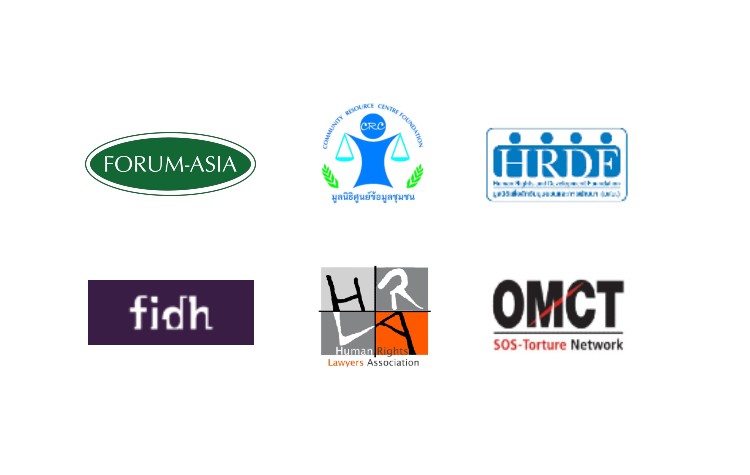
We, the six undersigned civil society organisations, reiterate our call for the Thai authorities to end judicial harassment against human rights defenders and to cease reprisals against former workers of Thai poultry company Thammakaset.
We also call upon the Government of Thailand to ensure that its national laws abide by international human rights laws and standards.
On 31 March, the Criminal Court of Bangkok will reach a verdict in criminal defamation suits against human rights defenders Nan Win and Sutharee Wannasiri. The suits were brought against them by Thammakaset in relation to social media posts which included a video clip by Fortify Rights that allegedly highlighted labour conditions that Thammakaset considered defamatory. The criminal defamation charges are offences under Article 326 and 328 of the Thai Criminal Code, which carry a sentence up to two-year imprisonment and a fine of up to 200,000 Baht.
The complaints against Nan Win and Sutharee are part of a wider group of cases filed by Thammakaset against former employees, activists and journalists. Since 2016, the company has filed at least 35 cases against 21 human rights defenders, comprising 14 former employees, an academic, a news reporter, and several human rights advocates.
Courts and prosecutors have dismissed some of the complaints brought by Thammakaset. In the latest, on 24 March, the Saraburi Provincial Court dismissed Thammakaset’s case against Nan Win for allegedly providing false testimony in court. In 2018 and 2019, the Don Mueang Court and the Bangkok Court of Appeals dismissed Thammakaset’s case against 14 migrant workers for defamation and providing false information to officials.
However, in other cases, human rights defenders have continued to be targeted by the poultry company. In December 2019, a former Voice TV news reporter, Suchanee Cloite, was found guilty by a provincial court for criminal defamation for a social media post, and sentenced to two years’ of imprisonment. In a string of charges brought by Thammakaset, Suchanee’s case was the first in which a guilty verdict was issued.
Currently, two cases of criminal defamation are in the preliminary hearing stage: the first, against former Thailand National Human Rights Commissioner Angkhana Neelapajit for two social media posts ; and the second, against Puttanee Kangkun for 14 social media posts. In these two cases, Angkhana and Puttanee were involved in promoting human rights advocacy and calling for the end of judicial harassment.
These instances reflect an escalating trend on the use of Strategic Lawsuits Against Public Participation (SLAPP) in Thailand. Thammakaset has been particularly aggressive in the use of SLAPP actions to silence criticism of labour conditions in its farms.
The alarming trend further highlights the use of defamation laws in Thailand, an echo of similar tactics across Asia, as a tool to suppress the freedom of expression and to stifle legitimate dissent. We reiterate the concerns and recommendations from a group of UN experts to the Government of Thailand and all relevant business enterprises including Thammakaset to stop judicial harassment by ensuring their duties and responsibilities are in line with the UN Guiding Principles on Business and Human Rights.
The Government’s commitment to the National Action Plan on Business and Human Rights (2019-2022) includes the assessment of the effectiveness of anti-SLAPP clauses found in the amended Article 161/1 and 165/2 of the Criminal Procedural Code, which aim to prevent cases of judicial harassment against human rights defenders.
Article 161/1 of the Criminal Procedural Code is designed to empower courts to dismiss private lawsuit cases found to be filed in bad faith. Similar to the Government of Thailand’s response at the UN Human Rights Council to a report after an official visit of the UN Working Group on Business and Human Rights to Thailand, the Thai Government representative praised the amendment as an overarching tool for courts to protect the freedom of expression against SLAPP lawsuits. However, in practice, these anti-SLAPP clauses are often disregarded. We are also concerned with the Thai Government’s denial of Thammakaset lawsuits as SLAPP cases, as it shows a lack of commitment towards addressing judicial harassment of HRDs.
Thailand, as a signatory to the International Covenant on Civil and Political Rights, is obliged to protect the freedom of expression of its people by ensuring that its laws are aligned with international human rights laws and standards.
The Government of Thailand should repeal criminal defamation laws, strengthen protective mechanisms for human rights defenders, and review anti-SLAPP clauses for their effective implementation. As more cases are expected to be deliberated in the coming months, the Thai authorities should ensure that its proceedings are transparent, impartial and fair, and guarantee that the accused human rights defenders have full access to protection mechanisms and the rule of law.
Signatory:
1. Asian Forum for Human Rights and Development (FORUM-ASIA)
2. Community Resource Centre (CRC)
3. FIDH – International Federation for Human Rights, within the framework of the Observatory for the Protection of Human Rights Defenders
4. Human Rights and Development Foundation (HRDF)
5. Human Rights Lawyers Association (HRLA)
6. World Organisation Against Torture (OMCT), within the framework of the Observatory for the Protection of Human Rights Defenders
***
For a PDF version of this statement, click here




